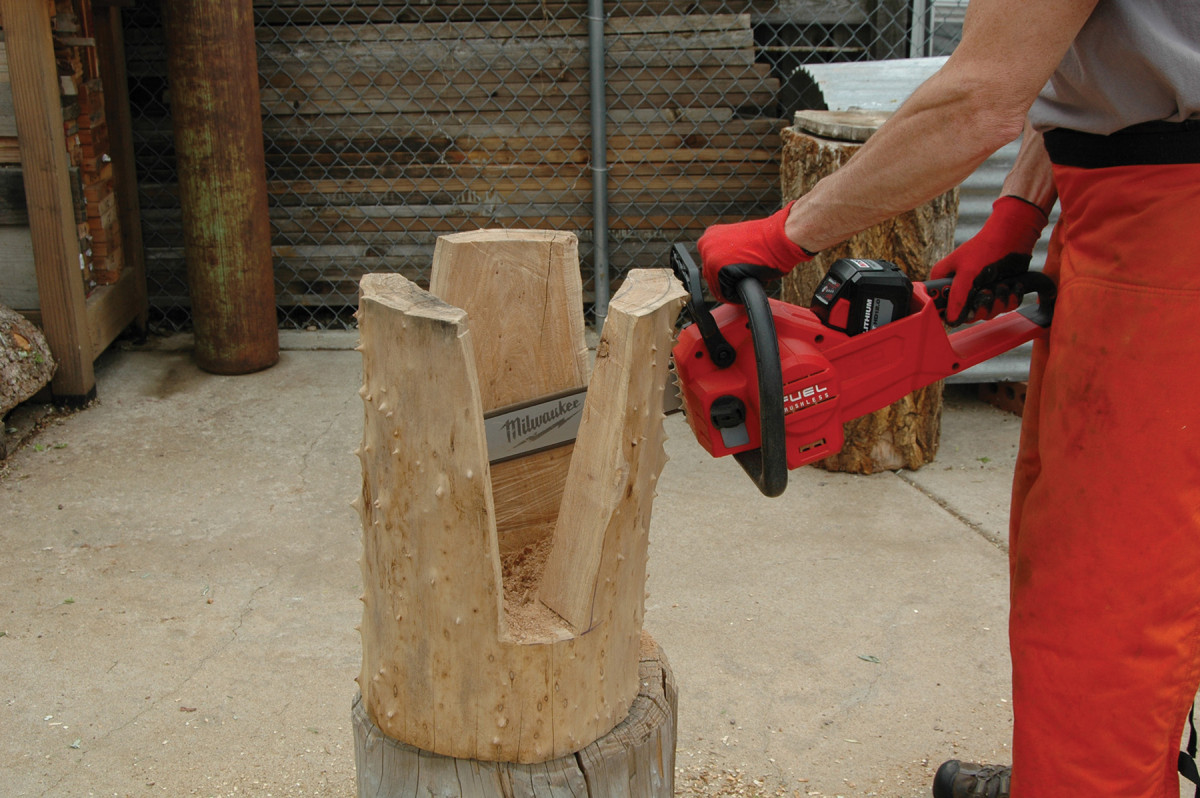We may receive a commission when you use our affiliate links. However, this does not impact our recommendations.

No gas, no fumes and plenty of power for green woodworking.
Tool: M18 FUEL Brushless Chain Saw
Manufacturer: Milwaukee Tool
MSRP: $449 (includes battery and charger)
I made the switch to battery-powered chainsaws for my tree service work in 2011 when pro-duty models first became available, and I never looked back. Battery power has replaced 2-stroke fuel on my jobs for all but the largest removals, and also replaced corded electric power at the shop for all but the longest rips when milling. As with many other tools, the grab-and-go convenience of cordless makes the choice easy. And compared to gas, there are appreciable benefits with reduced noise, toxic exhaust fumes, small engine maintenance and fuel hassles. It’s also nice to have a saw you can use indoors when needed.
Milwaukee is the latest manufacturer to come out with a battery-powered chainsaw, and it’s part of the same 18-volt platform as their most common cordless tools. The compatibility with other batteries and tools is a nice feature. Many similar chain saws are part of higher voltage outdoor power equipment lines so the battery pack you buy with those saws has limited uses.

A great roughing saw. An electric chainsaw is a great tool for turners, green woodworkers and anyone who doesn’t want to deal with gas and engines for sizing and roughing out raw logs.
I process interesting tree pieces into unusual lumber and sculptural parts, so I rip a lot of logs, tree crotches and curved branches down their length. Since these pieces are usually too unwieldy to run through the band saw, a chainsaw is the tool for the job. After filling the Milwaukee saw with biodegradable bar and chain oil (well worth the cost—trust me), I put it to work sectioning up various hardwoods into rustic bench parts. The 16″ bar is a size I use frequently, and the saw had decent balance and handling. It’s a bit heavy at 14 pounds, but 3.35 pounds of that is the monster battery pack. I liked the steel bucking spikes and didn’t mind that adjusting the bar required a wrench, but I wished the tool had a motor brake. And while I’m complaining, the acute angle of the clutch cover (seemingly designed for cosmetic appeal) trapped shavings readily behind the sprocket and was difficult to clear.
While not as fast under load as the more powerful saw I usually rely on, overall the Milwaukee proved to be a very gutsy saw, capable of powering through wood with the bar fully buried. That is, as long as I had the proper battery pack installed.
To evaluate cutting speed and runtime, I crosscut a freshly felled aspen trunk 7 1/2 inches in diameter – sized about half the usable length of the saw’s bar. Using Milwaukee’s new 12 Ah battery pack, which is optimized for the tool’s brushless motor, I made 54 half cuts and timed the first several at an average 5.43 seconds. With a 9 Ah high-density pack it also ran strong and almost as fast at 5.68 seconds. However, with a standard size 4 Ah pack, I only made 8 cuts at an average 7.43 seconds before the battery cells overheated and cut out.
So though this saw fits M18 battery packs of all capacities and ages, buying the saw tool-only and relying on any old M18 packs you already have around won’t cut it. For satisfactory performance with full-speed cutting free from stalling, the large 9 Ah or 12 Ah packs are the key.
Here are some supplies and tools we find essential in our everyday work around the shop. We may receive a commission from sales referred by our links; however, we have carefully selected these products for their usefulness and quality.









Of course, that supposed to read 54 1/2 cuts, not 54 half cuts.